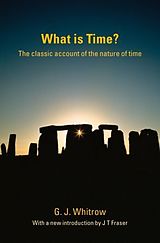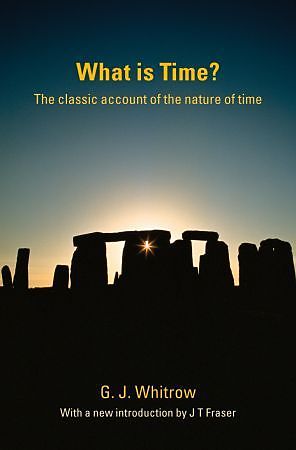What Is Time?
Einband:
Kartonierter Einband
EAN:
9780198607816
Untertitel:
The Classic Account of the Nature of Time
Autor:
G. J. Whitrow, Marlene P. Soulsby
Herausgeber:
OUP Oxford
Anzahl Seiten:
186
Erscheinungsdatum:
11.12.2003
ISBN:
0198607814
Professor Whitrow takes us on a good-humoured and wide-ranging tour of the thing that clocks keep (more or less). He discusses how our ideas of time originated; how far they are inborn in plants and animals; how time has been measured, from sundial and hourglass to the caesium clock, and whether time possesses a beginning, a direction, and an end. He coaxes the diffident layman to contemplate with pleasure the differences between cyclic, linear, biological, cosmic, and space-time, and he provides frequent diversions into fascinating topics such as the Mayan calendar, the migration of birds, the dances of bees, precognition, and the short, crowded lives of mu-mesons, particles produced by cosmic-ray showers that exist for just two millionths of a second.
Professor Whitrow takes us on a good-humoured tour of the thing that clocks keep (more or less). He discusses how our ideas of time originated; how far they are inborn in plants and animals; how time has been measured, from sundial and hourglass to the caesium clock, and whether time possesses a beginning, a direction, and an end.
Autorentext
G. J. Whitrow was the first President of the International Society for the Study of Time and held the same position in numerous other scientific societies. He was a frequent broadcaster on radio and his many books include 'Time in History', 'Atoms and the Universe' (with G.O. Jones and J. Rotblat) and 'Einstein: The Man and His Achievement'.
Dr J. T. Fraser is the founder of the International Society for the Study of Time and author of several books including 'Time, Conflict, and Human Values' . He is widely acknowledged as the world's foremost expert on the study of time.
Professor Marlene P. Soulsby is Associate Professor in German and Comparative Literature at Pennsylvania State University.
Klappentext
G. J. Whitrow (1912-2000) begins this classic exploration of the nature of time with a story about a Russian poet, visiting London before the First World War. The poet's English was not too good and when he asked a man in the street, 'Please, what is time?' he received the response, 'But
that's a philosophical question. Why ask me?'.
Starting from this simple anecdote, Professor Whitrow takes us on a good-humored and wide-ranging tour of the thing that clocks keep (more or less). He discusses how our ideas of time originated; how far they are inborn in plants and animals; how time has been measured, from sundial and hourglass
to the caesium clock, and whether time possesses a beginning, a direction, and an end. He coaxes the diffident layman to contemplate with pleasure the differences between cyclic, linear, biological, cosmic, and space-time, and he provides frequent diversions into fascinating topics such as the
Mayan calendar, the migration of birds, the dances of bees, precognition, and the short, crowded lives of mu-mesons, particles produced by cosmic-ray showers that exist for just two millionths of a second.
This reissue of the classic and authoritative What is Time? includes a new introduction by Dr J. T. Fraser, founder of the International Society for the Study of Time, and a bibliographic essay by Dr Fraser and Professor M. P. Soulsby of the Pennsylvania State University.
Inhalt
Introduction
1: The Origin of Our Idea of Time
2: Time and Ourselves
3: Biological Clocks
4: The Measurement of Time
5: Time and Relativity
6: Time, Gravitation and the Universe
7: The Origin and Arrow of Time
8: The Significance of Time
Appendix: Temporal Order in Special Relativity
Bibliography
Index

Leider konnten wir für diesen Artikel keine Preise ermitteln ...
billigbuch.ch sucht jetzt für Sie die besten Angebote ...
Die aktuellen Verkaufspreise von 6 Onlineshops werden in Realtime abgefragt.
Sie können das gewünschte Produkt anschliessend direkt beim Anbieter Ihrer Wahl bestellen.
Loading...
Die aktuellen Verkaufspreise von 6 Onlineshops werden in Realtime abgefragt.
Sie können das gewünschte Produkt anschliessend direkt beim Anbieter Ihrer Wahl bestellen.
| # | Onlineshop | Preis CHF | Versand CHF | Total CHF | ||
|---|---|---|---|---|---|---|
| 1 | Seller | 0.00 | 0.00 | 0.00 |
